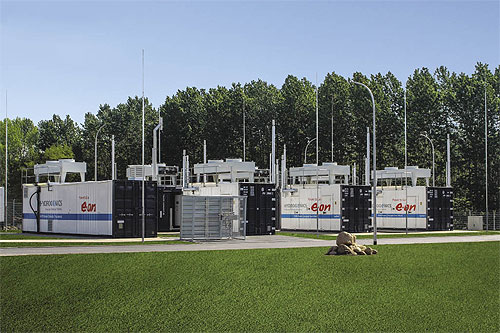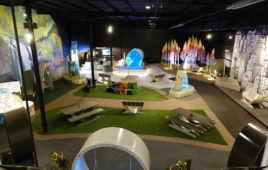By Paul J. Heney, Editorial Director
A developer and manufacturer of hydrogen generation and hydrogen-based power modules said that utility company E.ON has inaugurated commercial operations at its Power-to-Gas (P2G) facility in Falkenhagen, Germany. The plant uses wind power and electrolysis equipment from Hydrogenics Corp. to transform water into hydrogen, which is then injected into the existing regional natural gas transmission system. The hydrogen, as part of the natural gas mix, will be used in a variety of applications including space heating, industrial processes, mobility, and power generation. The 2-MW facility will produce 360 m3 of hydrogen/hr.

E.ON and Swissgas will begin commercial operations at the power-to-gas facility in Germany using Hydrogenics electrolyzers. The 2-MW facility will produce 360 m3 of hydrogen/hr.
“This project makes E.ON one of the first companies to demonstrate that surplus energy can be stored in the gas pipelines to help balance supply against demand,” said Ingo Luge, CEO of E.ON Deutschland. “This storage method is considered key technology for the transformation of Germany’s energy system. It will reduce the need to take wind turbines offline when the local grid is congested and will let us harness more wind power.”
Swissgas, which represents more than 100 local natural gas utilities, is a partner in the project with a 20% capital stake and an agreement to purchase a portion of the gas produced.
“Swissgas’ involvement demonstrates the significant value of Switzerland’s gas infrastructure, which lets us transport and store regenerative energy across national boundaries,” said Heinrich Schwendener, a member of the organization’s Board of Management.

The cut-away shows a few internal details of a Hydrogenic’s electrolyzer.
Daryl Wilson, CEO of Hydrogenics, said, “In April of this year we announced a second Power-to-Gas project with E.ON for the city of Hamburg. That facility, still under construction, will have the world’s largest single megawatt PEM (electrolyzer) stack and expects delivery in the spring of 2014. These projects serve as a platform for upcoming Power-to-Gas facilities in Europe and around the world.”
“One of the biggest challenges of transforming Germany’s energy system is finding ways to integrate the increasing share of intermittent, renewable-source energy,” said Phillip Rosler, Germany’s Economics and Technology Minister. “To ensure that Germany’s power system remains stable and our economy continues to have the energy it needs, we have to rapidly expand energy networks and require innovative solutions such as the P2G unit here in Falkenhagen.”
E.ON
www.eon.com/en.html
Filed Under: Green engineering • renewable energy • sustainability





Tell Us What You Think!